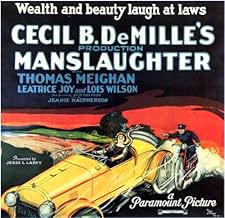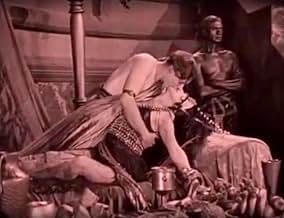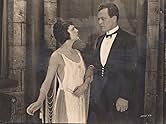Thrill-seeking society girl Lydia causes a motorcycle policeman's death and is prosecuted by her fiancé Daniel, who describes in lurid detail the downfall of Rome. While she's in prison, she... Read allThrill-seeking society girl Lydia causes a motorcycle policeman's death and is prosecuted by her fiancé Daniel, who describes in lurid detail the downfall of Rome. While she's in prison, she reforms and Daniel becomes a wasted alcoholic.Thrill-seeking society girl Lydia causes a motorcycle policeman's death and is prosecuted by her fiancé Daniel, who describes in lurid detail the downfall of Rome. While she's in prison, she reforms and Daniel becomes a wasted alcoholic.
- Director
- Writers
- Stars
- Awards
- 1 win total
- Dicky Evans
- (as Mickey Moore)
- Director
- Writers
- All cast & crew
- Production, box office & more at IMDbPro
Featured reviews
The acting is pretty good, and certainly less hammy than you would see in a typical DeMille flick.
There is one weird aspect of this film, and that is the Roman orgy scene. This "flashback" occurs while Meighan is summing up his case against Joy. The scene is complete with tigers, gladiators, people prancing around in weird outfits, and, if my eyes did not deceive me, two women making out. Later, there is another "flashback," with Meighan in some weird barbarian garb dragging Joy up some steps with a whip around her hands. Apparently this was DeMille's way of saying the country was going to hell in a hand cart. I quote from him: "I wished to show that a nation that is addicted to speed and drunkenness is riding for a fall. The best way to achieve this result was to picturize the greatest nation that ever suffered from these vices and show what happened to it. From this, it is easy to draw a modern parallel."
Has A Far Worse Reputation Than It Deserves
There are the usual Demille scenes of people having a great time getting drunk in wild costumes, and even worse, dancing; later, during Meighan's summing up, there's a flashback sequence in which barbarians in hairy vests and winged helmets break into where the Vestal Virgins are sleeping one off. Finally, there's redemption for the ladies in vague homilies and multi-denominational Christianity. Meanwhile, Meighan has been been going through his own spiral, thanks to the demon rum, but there's hope even for him, in the love of a good woman.
My vague and sarcastic gassing is not intended to put down this version, so much as to be entertaining while giving away as little as possible to those who have not seen this movie. Let's be honest: there are some people whose opinion is worthwhile, who claim this is the worst movie Demille ever made. I can see why. It's at the end of his cavort-for-six-reels-and-repent-in-the-seventh phase, and the public was growing a tad tired of them by this point. I don't think it's worse than any of the others. In fact, I think it rather typical. Had public tastes not changed, he would have kept on making them.
No, if there are issues, it's that remaining with the same format meant Demille's evolution from one movie to the next had to be incremental rather than revolutionary. Also, I don't think Miss Joy brings much to the part that a more skilled comedienne might have. However, Bebe Daniels was off doing comedies for another division of Paramount, and Gloria Swanson likewise. Contrariwise, Meighan is fine, and Miss Wilson, while poorly served, doesn't let the side down. The result is an entertaining movie that if not the overwhelming success that Demille had grown used to by this point, is certainly worth your time.
Women Behind Bars
Bacchannalian parties, which alternate between present and ancient Roman debauches, is a sure sign Cecil B. DeMille is directing. The O'Bannon character's flashbacks to ancient Rome are ludicrous DeMille indulgences. The better indulgence is the generous time DeMille's camera spends in a prison for women; his female prisoners are a lively bunch! The performances are sometimes entertaining, especially Joy and Wilson. Meighan starts off slow, but eventually succumbs to degradation. While fun is spots, this is NOT a great film. The love between Meighan and Joy is not particularly convincing; he shows more interest in Wilson, and might have been wise to run off with her. The story is sometimes inexplicable.
Symbolism likens a doughnut to a life preserver - so, why not a wheel? Coin collectors might enjoy the change in Meighan's pocket when he's down and out - two buffalo nickels and a standing liberty quarter.
***** Manslaughter (1922) Cecil B. DeMille ~ Thomas Meighan, Leatrice Joy, Lois Wilson
"Everything real – except the men and women"
But let's first take a look at how DeMille's formal style is at work here. It's a style he perfected early on in his career and which he never lost no matter how ridiculous his pictures became. What stands out most about Manslaughter is its incredibly precise pacing of the action, with each scene having its own rhythm. We open with a dynamic burst of quick cutting and constant motion. Things become more complex in the following party scene, with the movements of different characters in consecutive shots mimicking each other rhythmically to keep a continuous pace. DeMille uses similar techniques to step up the pulse of the picture within a single sequence. For example in the central court scene there is a quick shot of all the spectators rising to their feet, followed by the shot in which the Drummond's mother tears off Leatrice Joy's veil, the first shot giving impetus to the second. DeMille also makes strong use of space and lighting to give an emotional tone to each moment.
DeMille is unusual among directors with such a showy visual style, in that he always aims, through framing and lighting, to focus us on the actors. And like everything in DeMille's cinema, the performances tend to tread the line between naturalism and theatricality. Unfortunately Leatrice Joy is a little average, especially when compared to Gloria Swanson who had just completed a successful run of pictures with DeMille. Thomas Meighan too is a bit below par, his performance only being good in the meagre context that he is playing a stony-faced killjoy. Nevertheless the language of gesture and expression, always important in DeMille's pictures, adequately conveys their characters' intentions. This effect is spoiled only by the lengthy and over-abundant title cards. Having said that, you've got to love Jeanie Macpherson's way with words, with such gems as "Doesn't this doughnut remind you of a life preserver?" The storyline is of the highest grade DeMille-Macpherson moralist nonsense. It begins by railing against such scandalous transgressions as female boxing and pogo-stick racing, then follows up by making the point that such goings-on can be a gateway to even greater sins, such as accidentally killing a traffic cop. This daft righteousness is all pretty harmless, but what really makes Manslaughter a difficult story to relate to is the implausible motivations of its characters, in particular Thomas Meighan's. It seems bizarre that someone so uptight would even show his face at a jazz 'n' liquor party in the first place, let alone fall in love with one of the flappers "for what she might have been". Unless it's purely a sexual thing, like the minister in Sadie Thompson, but this is never implied and wouldn't really fit any better with the story arc.
It's no wonder that DeMille would soon begin making his points with large-scale spectacles. The stories he was now handling were too silly to have any real dramatic weight, and the most engaging moments of Manslaughter are the frenzied flashbacks of a decadent Rome. It also looks as if those were the scenes DeMille had the most fun staging. As it is, Manslaughter is a decidedly mediocre effort, nicely directed but with the wrong material for small-scale drama.
Over-abundant stereotyped gestures bias an otherwise OK plot
Other powerful means were also available to early cinema: just think of close-ups, or the expression of a face... Similar cinematic tricks were not possible in the theatre: they were some of the tools of cinema as a new means of expression, or - in rare cases - art.
Among the filmmakers, some realized it earlier, some later...
Did you know
- TriviaIn order to correctly write a script that would depict the experience of a woman being arrested and imprisoned, screenwriter Jeanie Macpherson arranged, at Cecil B. DeMille's behest, to be imprisoned for stealing a fur piece from a friend (with whom she had worked out an agreement beforehand). She was arrested in Detroit, booked and fingerprinted under the name Angie Brown and spent three days in jail before a police official discovered the truth and arranged for her release. Macpherson wrote about the experience in an article called I Have Been in Hell.
- Quotes
Lydia's Chaperon: Make Dan keep an eye on her, Eleanor. If she will show up for anybody, she will for him - but as her chaperon, I won't stay and be party to such goings on!
- ConnectionsFeatured in The Love Goddesses (1965)
Details
Box office
- Budget
- $385,000 (estimated)
- Runtime
- 1h 40m(100 min)
- Color
- Sound mix
- Aspect ratio
- 1.33 : 1






































